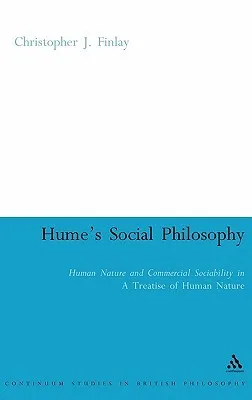Hume’s Social Philosophy: Human Nature and Commercial Sociability in A Treatise of Human Nature
4.9
Reviews from our users

You Can Ask your questions from this book's AI after Login
Each download or ask from book AI costs 2 points. To earn more free points, please visit the Points Guide Page and complete some valuable actions.Welcome to an exploration of 'Hume’s Social Philosophy: Human Nature and Commercial Sociability in A Treatise of Human Nature', where we delve into the profound insights of David Hume, a seminal philosopher of the Enlightenment era. This book provides a comprehensive analysis of Hume’s exploration of human nature, social dynamics, and the rise of commercial society.
Detailed Summary of the Book
Christopher J. Finlay's work offers a meticulous examination of David Hume's perspectives on human nature as articulated in his magnum opus, A Treatise of Human Nature. Hume, a Scottish philosopher, approaches human nature with an empirical lens, dissecting the elements that form the foundation of social interaction and cohesion. This book underscores Hume's belief that humans are inherently social creatures and that their behaviors are largely influenced by emotions and experiences rather than pure reason.
Finlay's book seeks to unpack Hume's views on commercial sociability—the idea that commercial society can engender sociability among individuals. By analyzing key passages in Hume's Treatise, Finlay highlights how commerce, far from corrupting morality, can actually foster social harmony and mutual respect. He articulates Hume's argument that trade and commerce provide vital structures within which individuals can identify and cultivate shared interests, thereby reinforcing social bonds.
Key Takeaways
- Hume views human beings as fundamentally driven by passion and emotions, which shape our social interactions more significantly than rational thought.
- The development of commercial society does not necessarily erode moral values; instead, it can enhance social cooperation and mutual civility.
- Hume suggests that human nature and society are interconnected in such a way that economic interests can serve to bring individuals together in a civil society.
- Hume's analysis provides a nuanced understanding of how social institutions and practices emerge from the natural traits and tendencies of human beings.
Famous Quotes from the Book
"Human nature is inherently complex and driven by more than just logic; it is the passions that truly dictate human interaction."
"Commerce and trade do not merely sustain livelihoods; they also weave the fabric of society, fostering connections among individuals."
Why This Book Matters
Hume’s exploration of the dynamics between human nature and societal constructs remains profoundly relevant today, providing deep insights into contemporary debates on economics, sociology, and ethics. Hume’s Social Philosophy: Human Nature and Commercial Sociability in A Treatise of Human Nature intricately links philosophical discourse with practical societal implications, making it an indispensable resource for students, scholars, and anyone interested in the philosophical grounding of social sciences.
Christopher J. Finlay succeeds in making Hume's complex theories accessible and applicable to modern society, encouraging readers to reconsider the implications of trade, commerce, and interpersonal relations through the lens of human nature.
Free Direct Download
You Can Download this book after Login
Accessing books through legal platforms and public libraries not only supports the rights of authors and publishers but also contributes to the sustainability of reading culture. Before downloading, please take a moment to consider these options.
Find this book on other platforms:
WorldCat helps you find books in libraries worldwide.
See ratings, reviews, and discussions on Goodreads.
Find and buy rare or used books on AbeBooks.
1259
بازدید4.9
امتیاز50
نظر98%
رضایتReviews:
4.9
Based on 0 users review
"کیفیت چاپ عالی بود، خیلی راضیام"
Questions & Answers
Ask questions about this book or help others by answering
No questions yet. Be the first to ask!


